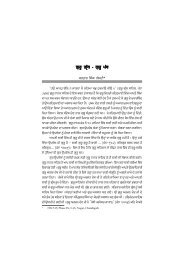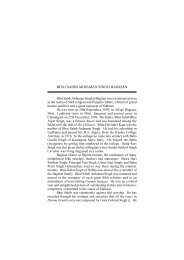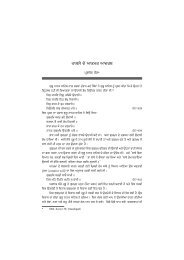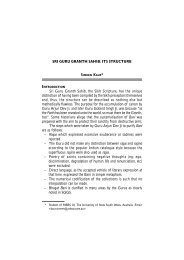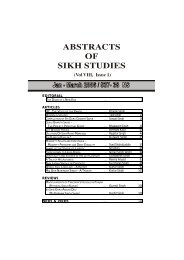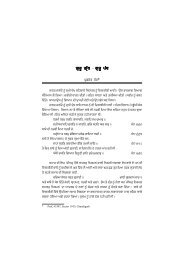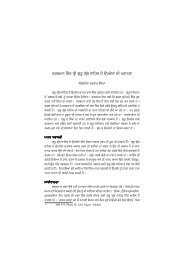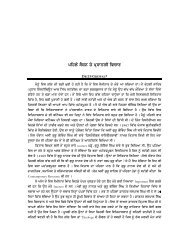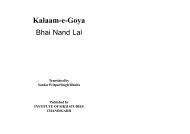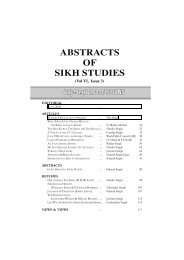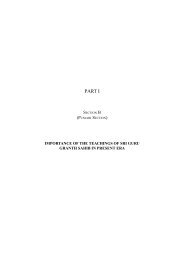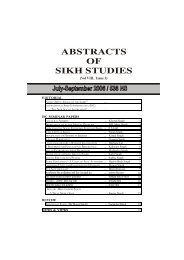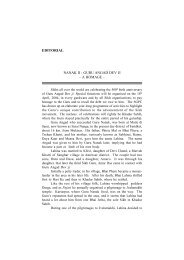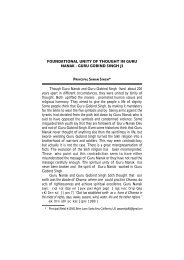editorial articles reviews news & views - Institute of Sikh Studies
editorial articles reviews news & views - Institute of Sikh Studies
editorial articles reviews news & views - Institute of Sikh Studies
Create successful ePaper yourself
Turn your PDF publications into a flip-book with our unique Google optimized e-Paper software.
70<br />
ABSTRACTS OF SIKH STUDIES : APRIL-JUNE 2005 / 537 NS<br />
<strong>of</strong> the <strong>Sikh</strong> scripture is beyond any doubt” (Contesting Interpretations p.<br />
305) The point is that there was absolutely no need for him to raise<br />
this point at all.<br />
McLeod’s basic mischief in denying the originality for Guru<br />
Nanak’s thought and starting a nirmal panth, a sovereign entity, by its<br />
own right, stands apart. He denies the very import <strong>of</strong> Guru Nanak’s<br />
revelation as one would deny Lord Buddha’s revelation or that <strong>of</strong><br />
Christ. To begin with, I repeat here what I stated in The <strong>Sikh</strong>s In History<br />
(New Delhi 1999) pp14-19:<br />
“Guru Nanak during the process <strong>of</strong> revelation gained new vistas<br />
<strong>of</strong> cosmic consciousness that divine light permeates the entire<br />
universe and it’s the only source <strong>of</strong> light in all human beings.<br />
Universal brotherhood <strong>of</strong> humankind and common heritage shorn<br />
<strong>of</strong> any limiting angularities, formed an essential part <strong>of</strong> the<br />
revelation. The issues that agitated the minds <strong>of</strong> the people were<br />
naturally the divisions within Hinduism and Islam, and relevance<br />
<strong>of</strong> God as a factor in social interaction as between various sectors<br />
<strong>of</strong> society.<br />
“Basically, the issues impinged on social responsibility. These<br />
were beyond the pale <strong>of</strong> any school <strong>of</strong> the Hindu thought. Neither<br />
the Vedas, the Shastras, and Smritis, nor the various religious<br />
teachers and law-givers – none <strong>of</strong> them – laid down social<br />
responsibility on anyone, much less a section <strong>of</strong> the society, to<br />
ameliorate the socio-political condition <strong>of</strong> the people. Rather by<br />
laying emphasis on asceticism and world-withdrawing doctrines<br />
that caused withdrawal from productive work and dependence<br />
on alms for sustenance, the Hindu socio-religious orders had<br />
become parasitic and irresponsible. Even the Bhaktas who were<br />
critical <strong>of</strong> the caste system and repudiated essentials <strong>of</strong><br />
Vaishnavism, advocated individual moksha, deliverance. They<br />
were not for acceptance <strong>of</strong> social responsibility. None <strong>of</strong> them,<br />
in consonance with Hindu thought, raised his voice against the<br />
prevalent political oppression, despite some <strong>of</strong> them including<br />
Kabir and Namdev facing personal persecution at the hands <strong>of</strong><br />
the rulers...<br />
“It was reserved for Guru Nanak to charter a new order by an



